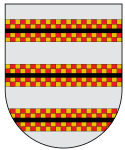Lordship del Castillo de Carpio
Señorio del Castillo de Carpio Señorio del Castillo de Carpio (in Spanish) | |||||||||||
|---|---|---|---|---|---|---|---|---|---|---|---|
| 1325–1559 | |||||||||||
| Common languages | Latin, Spanish language | ||||||||||
| Religion | Roman Catholic | ||||||||||
| Government | Señorio tied to the Spanish crown | ||||||||||
| House of Sotomayor House of Haro | |||||||||||
• 1325 | García Méndez de Sotomayor | ||||||||||
• 20 January 1559 | Philip II of Spain | ||||||||||
• 1558 | Diego López de Haro y Sotomayor | ||||||||||
| Historical era | Middle Ages – present | ||||||||||
• Established | 1325 | ||||||||||
• Disestablished | 1559 | ||||||||||
| |||||||||||
| Today part of | El Carpio, Andalucía, Province of Córdoba, Spain | ||||||||||
| History of Spain |
|---|
 18th century map of Iberia |
| Timeline |
The Lordship del Castillo del Carpio (Sp: Señorio del Castillo de Carpio or the Señorio del Carpio) was a Spanish title of nobility established in 1325 by García Méndez de Sotomayor.[1] The title lends its name to the House of Carpio.
History
[edit]The lands consisting of the Señorio del Castillo de Carpio were conquered by King Ferdinand III of Castile in 1240 as a part of the larger Reconquista. Part of the lands conquered in Ferdinand III's Alcocer (Al-Qusayr) campaign were granted to one of the families that assisted in the campaign, namely the Meléndez or the House of Méndez de Sotomayor. By 1325, Garcia Méndez de Sotomayor managed to unite the lands granted to his family and built a tower at El Carpio to be used as the center of government for his lands. The tower was completed in 1325 which is also the date associated with the founding of the Señorio del Castillo de Carpio.
In 1559, the title was upgraded to the Marquesado del Carpio in 1559 by King Philip II of Spain to the relevant holder, Diego Lopez de Haro y Sotomayor on 20 January 1559 in recognition of his services to the crown,[2]
It is unclear whether the first Marques of Caprio was in fact Diego López de Haro y Sotomayor. Some sources record Diego López as the I Marques[3] and others record Diego López' father Luis Méndez de Haro y Sotomayor as the I Marques.[4] What does appear clear is that Luis Méndez was indeed the 9th Señor del Carpio inheriting the title from his parents and that his son Diego López was also the Marques. Whether the title was conferred upon the 9th or 10th Señor del Carpio appears to be the main question. Luis Méndez inherited the Señorio del Carpio from his mother Beatriz Portocarrero Cárdenas in 1528 according to Margarita Cabrera Sánchez.[4] If the date of the upgrade to a Marquesado is accurately put at 1559, it would seem that the first Marques of Carpio was indeed Diego López de Haro y Sotomayor, which is supported by the Real Academia de la Historia.[1]
Title holders
[edit]- This list is based on one single source which is contradicted by other sources. As such, it may be incomplete, inaccurate or missing persons.
| Title | Dates | |
|---|---|---|
| Created by Philip II of Spain | ||
| I | García Méndez de Sotomayor[5] | 1325–? |
| II | Garcí Mélendez de Sotomayor[5] | ?–? |
| III | Gomez García de Sotomayor[5] | ?–? |
| IV | Garcí Méndez de Sotomayor[5] | ?–? |
| V | Luis Méndez de Sotomayor | ?[5]–? |
| VI | Garcí Méndez de Sotomayor[5] | ?–? |
| VII | Luis Méndez de Sotomayor[5] | ?–? |
| VIII | Beatriz de Sotomayor[5] | ?–? |
| IX | Luis Méndez de Haro y Sotomayor[3] | ?–? |
| X | Diego López de Haro y Sotomayor[5] | ?–20 January 1559 – Title upgraded to Marquesado del Carpio |
See also
[edit]References
[edit]- ^ a b Vv. aa. Boletin de la Real Academia de la Historia. Tomo CLXXI. Numero I. Año 1974. Madrid: Real Academia de la Historia. p. 212. Retrieved 27 March 2015.
- ^ Profeti, Maria Grazia (2000). Otro Lope no ha de haber – Volume 2°. Firenze: Università di Firenze. Dipartmento di Lingue e Letterature Neolatine. p. 111. ISBN 8881253828. Retrieved 30 March 2015.
- ^ a b "CARPIO" (in Spanish). Grandesp. 30 August 2006. Archived from the original on 16 April 2012. Retrieved 27 March 2015.
- ^ a b Cabrera Sánchez, Margarita. "El Señorío de El Carpio en el Siglo XV" (PDF). helvia.uco.es (in Spanish). Aragón en la Edad Media 14-15 (1), 227-242 (1999). Universidad de Zaragoza, Departamento de Historia Medieval, Ciencias y Técnicas Historiográficas y Estudios Árabes e Islámicos. p. 235. Retrieved 27 March 2015.
- ^ a b c d e f g h i Guevara y Váldes, Eduardo Pardo de (2005). Actas de la XI Reunión Americana de Genealogía [Acts of the 11th American Reunion of Genealogy] (in Spanish). Instituto Padre Sarmiento de Estudios Gallegos (Santiado de Compostela). Xunta, Galacia: Editorial CSIC – CSIC Press. pp. 461–466. ISBN 8400083369. Retrieved 8 April 2015.


 French
French Deutsch
Deutsch
